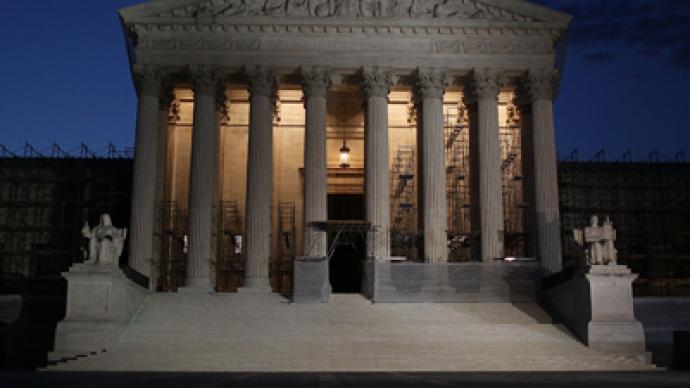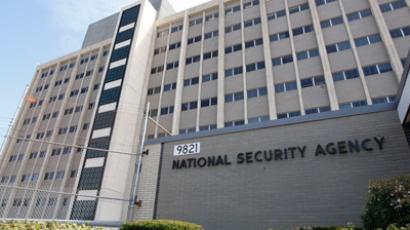Supreme Court to rule on legality of wiretapping through FISA

The fight to stop the government's sweeping surveillance of emails and phone calls will go all the way to the Supreme Court. The ACLU has filed a lawsuit challenging the warrantless wiretapping provisions included under the FISA Amendment Acts.
The US House of Representative voted last week to reauthorize the 2008 amendments added to the Foreign Intelligence Surveillance Act, or FISA, that allow for blanketing surveillance and eavesdropping of any communication suspected to be sent outside of the United States. Under the FISA Amendment Act (FAA), the government is granted the power to peer into the inboxes of any American and listen in on long-distance calls without ever requiring a judge’s approval. Pending approval from the Senate, the FAA will be renewed this year and be left on the books for another five years. The American Civil Liberties Union is adamantly opposed, however, and has asked the highest court in America to intervene.On Monday, attorneys with the ACLU filed a brief (.pdf) with the Supreme Court challenging FISA and the FAA in hopes of keeping the feds from further snooping on message assumed to be private but made open to the National Security Agency with little oversight into their endeavors. The claim was filed on behalf of plaintiffs composed of human rights activists, attorneys, journalists and others opposed to the act “whose work requires them to engage in sensitive and sometimes privileged telephone and e-mail communications with people located outside the U.S,” the ACLU explains.“Under the FAA, the government can target anyone — human rights researchers, academics, attorneys, political activists, journalists — simply because they are foreigners outside the United States, and in the course of its surveillance it can collect Americans’ communications with those individuals,” the ACLU writes in the brief. Despite being allowing already for extensive, dragnet surveillance power, the ACLU notes in their suit that “the FAA dispenses with the requirement that the government specify the facilities to be monitored,” allowing the number of Americans to be targeted, purposely or not, to be infinite. Sen. Ron Wyden (D-Oregon) asked the NSA to provide Congress with a number of Americans targeted under the FAA earlier this year, only to be told that informing him of as much would “violate the privacy” of the Americans already targeted.“This means that the government does not need to seek FISA Court approval for each of the phone numbers of email addresses at which its surveillance is directed,” the ACLU claims, adding that surveillance can be aimed at “categories of phones numbers and email address or even gateway switches through which millions of Americans’ communications flow.”“Rather than target its surveillance power at a specific person thought to be the agent of a foreign power, the government can target its surveillance power at a group of people, a neighborhood, a country or a geographic region,” it continues. As a result, the ACLU has reason to believe that their clients can be routinely watched.“Some plaintiffs communicate with people who have been the targets of surveillance or other US government attention in the past,” the brief reads. Journalist Naomi Klein, for example, communicates with indigenous rights advocates in Columbia who may discuss issues relating to America’s involvement in that country’s government. Joanne Mariner, the Terrorism and Counterterrorism Program Director at Human Rights Watch, regularly corresponds with former CIA detainees for her job, and attorney Sylvia Royce is required to communicate with experts in Europe about the cases of persons kept locked up in US military prisons.The ACLU notes that an appeals court panel agreed in 2011 that “plaintiffs have good reason to believe that their communications, in particular, will fall within the scope of the broad surveillance that they can assume the government will conduct,” and the full body of U.S. Court of Appeals for the Second Circuit later refused the government’s attempts to have them reconsider.“But instead of allowing the case to be heard on the merits, the Obama administration asked the Supreme Court to review the case,” the ACLU’s Ateqah Khaki, writes. “Our brief urges the Court to affirm the appeals court’s decision.”When the House voted to extend the FAA last week, the majority of testimonies delivered favoring the reauthorizing revolved around the alleged necessity of the act for counterterrorism purposes. Rep. Lamar Smith (R-Texas) sponsored the bill and said, “We have a duty to ensure the intelligence community can gather the intelligence they need to protect our country.”“Foreign nations continue to spy on America to plot cyber-attacks and attempt to steal sensitive information from our military and private sector industries,” and that Congress has “a solemn responsibility to ensure that the intelligence community can gather the information,” Rep. Smith said.His opponents argued that the intel gathering allowed under the FAA was detrimental to civil liberties, however, and has put the communications of each and every American at risk.“Everyone becomes suspect when big brother is listening,” Rep. Dennis Kucinich (D-Ohio) argued on the Hill.In a separate case, the Electronic Frontier Foundation has sued the Obama administration for failing to adhere to a Freedom of Information Act request for information on the FAA. The ACLU reports that oral arguments in front of the Supreme Court regarding this week’s brief are slated to begin October 29.














